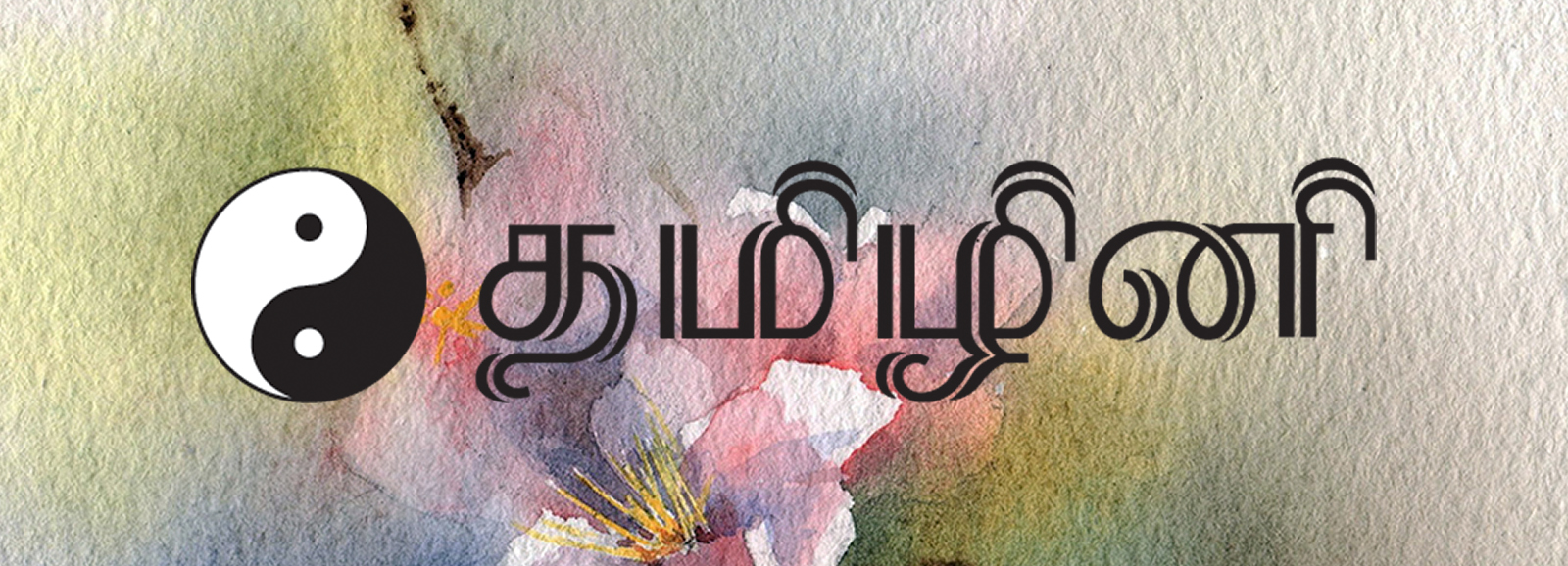Part 1 : https://tamizhini.in/2018/11/14/the-ba-in-the-bapu-kannan-t/
(5)
Manilal, the second son of Gandhi and Kasturba, also had a strenuous apprenticeship under his father. More than Harilal, it was Manilal, who had often been at the receiving end of Gandhi’s experiments. Harilal was away from Gandhi for long periods during his formative years. But Manilal spent a good part of his childhood and teenage with Gandhi. As a young boy, when he fell seriously ill at Bombay, and didn’t quite respond to the doctor’s treatment and the doctor wanted to give eggs or chicken soup, his father nursed him back to health through his nature cure methods.
It is quite paradoxical that a man as compassionate as Gandhi can be such a stubborn person. After one of their 5-mile walk from home to office at Johannesburg, Gandhi noticed that Manilal had left behind his spectacles at home. He sent him back to get them. Arun Gandhi narrates the ensuing tale he had heard from his father. It throws light on the manner in which Kasturba played the difficult bridging role between the idealistic father and his sons.
‘Kasturba was surprised to see him.
“What happened?” she asked. “Why have you come home alone?””I forgot my spectacles,” the boy said. “Bapu sent me to get them, and now I have to go back to the office.” He sighed deeply, hoping his mother would show sympathy and save him from another ten-mile round-trip trek to the city and back. Kasturba did not want to countermand Mohandas’ order. She quickly prepared some food, then called to Manilal. “Come,” she said. “Your lunch is ready.” While her son ate, Kasturba sat beside him at the kitchen table. How could she impress upon this 12-year-old boy the importance of his father’s strong ideals? How could she make him understand? “I know how it is to feel that Bapu is demanding too much of you.” She paused, studying her son’s reaction, then continued. “It happened to me once, on a day long ago. You were only five or six years old, then, and we were living in Durban. Remember?”
She told Manilal the story of how she was almost thrown out of the house for refusing to clean the chamber part of a visitor.
Even now, Kasturba said, she could not quite see how an argument about the cleaning of one little chamber pot could be so important as to make him want to drive his wife out of his home in a strange land. Yet that incident, she said, had proved one thing to her: the seriousness of Bapu’s beliefs. She had vowed, then and there, that even though she could not, on her own account, accept any of her husband’s peculiar new notions unless she was convinced he was right, she would try always to understand his way of thinking and, whenever possible, acquiesce to his wishes. “What I do know,” Kasturba concluded, “and what you must understand is this: your father is a good man. He wants you to be a good son, and that is why he asks you to do hard things.” Smiling, she ran her fingers through Manilal’s unruly hair. “You are a good son, and that is why you must do as he asks — even the hard things. Now finish your lunch quickly and get back to the office before he begins to wonder what has happened to you.” Years later, my father Manilal liked to tell his own children about the day he forgot his spectacles. He would conclude by assuring us that was how he learned not to forget things. But I always sensed that what made him remember the incident so vividly was not his father’s stern discipline, but his mother’s firm and loving guidance.
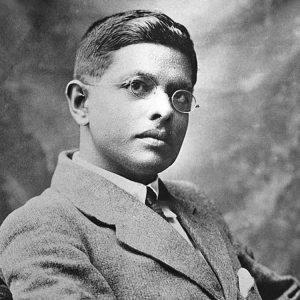
Manilal Gandhi
Many decades later, Kasturba would face a similar situation in an entirely different circumstance. She had been arrested when she, on her own, joined the Satyagraha in Rajkot, in 1939. The Thakore’s government had placed her in solitary confinement, before allowing Manibehn Patel and Mridula Sarabhai to join her. Gandhi had rushed to Rajkot to negotiate a peace. Promises were breached and he started a fast. On the third day of the fast, Kasturba was sent by the government to be with Gandhi. She herself was in a frail condition, but Gandhi sent her back at night. Kasturba complied. Sushila Nayar, who was with them at that time, writes:
“How did you come?” he asked her. Ba told him that Government had sent her word that she could go to see her husband if she wanted to and so she had come. The Government car which had brought her from her place of detention had gone away after leaving her there and until night no one came to take her back. Obviously Government had contemplated releasing her in this indirect manner, but Gandhiji was not prepared to accept it. “If they wish to release you,” he said, “they must do so in the proper manner and release your two companions, Mani and Mridula as well.” He sent her back to the detention camp at 10 o’clock at night. Somebody remarked that the road leading to the detention camp was closed to private vehicles without a special pass. Bapu turned round to Ba and said, “If they stop your car, you should offer Satyagraha and refuse to come back. You will spend the night on the roadside if need be.” Ba obeyed him silently. What must have been passing through her mind at that time? It was not an easy thing for her to leave her husband’s bedside while he lay fasting. Gandhiji had written a letter to the Government explaining the whole position. They dared not make her spend the night on the roadside. So she was taken back to the detention camp and the next day she and her two companions were formally released. They were with Bapu by 3 o’clock in the afternoon. Gandhiji’s condition was causing a little anxiety on that day and Ba forgetting her own frail health and tired body lost herself in ministering to him.
A few years after Kasturba had died, Gandhi would do a similar deed again. In the death fields of Naokhali, he would send another teenager on a riskier mission. When Manu Gandhi forgot Gandhi’s soap stone (presented to him many years ago by Mira Behn), when they moved from one village to another, Gandhi sent her back to find it and fetch it, alone, late in the night. He thought it was necessary for her to build her character and courage. She found the stone, brought it back and threw it at Gandhi’s feet. Manu, initially a protege’ of Kasturba, went on to serve Gandhi till the end, and called him, her ‘mother’. Despite the much reviled brahmacharya experiments involving her, Bapu became Ba for her.
Before Manu, Manilal had done the same, remonstrating but ultimately always surrendering to his father. He was ever the obedient son. In fact, he turned out to be the most worthy successor to his father, continuing his work in South Africa till the very end. He kept the Phoenix farm and the Indian Opinion going. He first went to jail as a seventeen year old. He was imprisoned in the Apartheid era of South Africa, participating in the Defiance Campaign in 1950s, when he was over sixty years old. He continued to insist on non-violence as an essential moral principle, at a time when the increasingly desperate young revolutionaries like Nelson Mandela were only considering it as a strategic weapon, and were on the verge of veering towards violence.
Yet, he had to go through a long phase when he pliantly subjected himself to many personal hardships, trying to grow up to be the son his father wanted him to be. A son who would be in total control of his senses and put the public cause ahead of his personal needs.
It started with simple activities like eating. Manilal was in the habit of overeating his favourite food, puran poli. Kasturba must have been controlling the quantity he ate. Gandhi put an end to it one day, asking her to keep serving him as much as he can eat. He suffered the consequences before learning the lesson of controlling his appetite.
There were harder lessons in store. Gandhi had left his family behind at Phoenix farm, while he continued his practice at Johannesburg, and then setup base at Tolstoy farm. The Phoenix farm had grown in numbers. Gandhi’s close friend, Pranjivan Mehta, had sent his young, but married, daughter, Jeki, to be with them on the Phoenix farm. Her husband, [Manilal Doctor] who had also briefly visited Phoenix and Tolstoy farms, when they were still engaged, was then in Fiji.

Manilal Gandhi and Jeki had an affair. This is what, Gandhi termed in his autobiography, without naming them, as ‘the moral fall of two of the inmates of the Ashram.’ He says Kasturba had warned him earlier, but ‘being of a trusting nature, I had ignored her caution.’ It must have truly been a ‘thunderbolt’ for him. Earlier, writing to Jamnadas, he had mentioned, “She (Jeki) is, for the present, my only adopted daughter. She is mine more than Dr. Mehta’s so that it seems likely she will remain with me.” Kasturba might have held Jeki responsible for this. Millie Polak, most certainly thought so. She wrote about her conversation on this with Gandhi (using the name Lila for Jeki, and N for Manilal): “Of course, you cannot be held blameworthy,” I continued. “Lila was not ignorant. She knew what she was doing. She has behaved disgracefully! It is dreadful for you, I know, but no one can hold you responsible for it.”
Gandhi felt responsible for the lapse, and took upon himself a cleansing penance – ‘a fast for seven days and a vow to have only one meal a day for a period of four months and a half.’ Manilal too reciprocated and took on the same penance. In addition, he, on his own or under Gandhi’s urging, vowed not to marry till his father released him from his vow. He went to stay with his father at Tolstoy farm. Jeki, for her part, cropped her hair, wore a dress of mourning, and took on dietary restrictions. Later, Jeki accompanied Kasturba when she offered Satyagraha and went to prison.
Kasturba, when she was seriously ill a few months later, still nursed her suspicions about Jeki. Gandhi and Kasturba had a serious spat over her suspicions. Jeki also seemed to have given cause for suspicions (however, not restricted to Manilal this time.) “Jeki and Mrs. Gandhi have put such a severe strain on me that I feel like doing nothing at all. I have never been so sorely tried as I am just now,” Gandhi confided to his friend Kallenbach. Gandhi had more harsh words to write to him about both of them, in different letters during this phase. In an especially vexed and vicious letter about Kasturba, Gandhi laments:
“And I again gently but rebukingly remarked that she was sinful in her thought and that her disease was largely due to her sins. Immediately she began to howl. I had made her leave all the good food in order to kill her, I was tired of her, I wished her to die, I was a hooded snake. The manner of the delivery of these remarks was most vicious. I told her even though she was ill, I could not pity her in her sins. The more I spoke the more vicious she became. I kept completely self-possessed. I apologized to her and told her that henceforth even to that extent I would not remonstrate with her. Nor would I. She has a character and she has none. She is the most venomous woman I have ever met. She never forgets, never forgives. She is quite normal today. But yesterday’s was one of the richest lessons of my life. All the charges she brought against me she undoubtedly means. She has contrary emotions. I have nursed her as a son would nurse his mother. But my love has not been sufficiently intense and selfless to make her change her nature. […] Truly she has so far been my best teacher. She teaches me emptiness of the world, she teaches me patience, forgiveness, greater need for self-sacrifice, for love and charity. The incident leaves me, I hope, a better, wiser, more loving man if it also leaves me sadder. Yes, a man who wishes to work with detachment must not marry. I cannot complain of her being a particularly bad wife or bad woman. On the contrary no other woman would probably have stood the changes in her husband’s life as she has. On the whole she has not thwarted me and has been most exemplary. But how can a leopard change his spots? And yesterday’s incident would probably not have happened either in an ordinary household. My point is that you cannot attach yourself to a particular woman and yet live for humanity. The two do not harmonise. That is the real cause of the devil waking in her now and again. Otherwise he might have remained in her asleep and unnoticed.”
On finding the second transgression of Jeki, Gandhi went on another 7-day fast. The strained relationship with Kasturba got mended. From being the nursed, Kasturba became the nurse. We see this role reversal again on other occasions. Every fast was more taxing on Kasturba than Gandhi.
This fast has brought me as near death’s door as possible. I can still hardly crawl, can eat very little, restless nights, mouth bad. But it would be all right. The fast was a necessity. I was so grossly deceived. I owed it to Manilal of Fiji, to Dr. Mehta, and to myself. It was one of the severest lessons of my life. The discipline was very great. Everyone around me was most charming. Mrs. Gandhi was divine. Immediately she realized that there was no turning me back, she set about making my path smooth. She forgot her own sorrows and became my ministering angel. And she still remains the same. The result is that she is better in health. I appealed to all not to go in for fasting but to rejoice that one of themselves was trying to purify himself. All caught the fire and I was helped all along.
The burden was lifted off Gandhi, only after Jeki was sent to Fiji to join her husband.
[We keep stumbling upon so many remarkable and unsung characters in Gandhi’s story that it is impossible to stick to a straight narrative. From Gandhi’s letters, Jeki’s husband, Manilal Doctor, a lawyer, comes across as an extremely interesting person. Despite his refusal to partake in manual work at the farm, Gandhi held him in high esteem. He had first met Gandhi at London in 1906 when he was studying to be a barrister, and at Gandhi’s instance, went to work for the Indians in Mauritius. He founded a daily in Mauritius, which appeared in English and Hindi, for advocating the cause of Indians in the Colony. Gandhi held that it was partly due to his efforts that the proposal to ban indentured immigration into the Colony materialized. He later did important work in Fiji. He was expelled from Fiji, and was denied permission to practise law in Australia, New Zealand, Singapore and Ceylon, and even in Bombay and Madras High Courts. Gandhi termed it a ‘a remarkable instance of how a man can be hunted down in the “great” British Empire for holding an opinion.’ His name was struck off the Barristers’ list. Finally he had worked in Patna High court before moving to Aden.
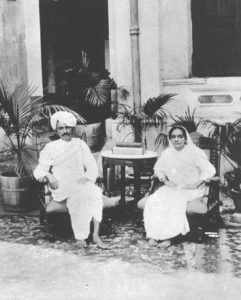
During the heated months of the affairs in Phoenix, Manilal Doctor had sought help from the Governor-General to take his wife back, when he heard of her transgression. But she chose to be in jail instead, and didn’t leave after being released too, till it became untenable for her to be kept at Phoenix.]
The travails of Manilal Gandhi were not yet over. Two years after reaching India, Manilal was banished from Gandhi’s ashram at Kochrab. Going against his father’s orders, Manilal had sent money from the ashram funds to his brother Harilal. Gandhi was upset when he came to know about it. He feared that if others emulated Manilal, the ashram funds would be completely depleted. Manilal was worried that his father would take up another penitential fast, and urged him against it. Instead, Gandhi wanted Manilal to go to Madras, carrying no money, and earn his living by not disclosing his identity. He should come back only after he earned the money lent to Harilal. Manilal left for Madras with tears and no money. With no knowledge of Tamil, Manilal had a tough time in Madras. He was literally on the streets. His father kept in touch with him through letters, advising him on issues from how to deal with poverty to mosquitoes. After a struggle of nearly a month, Gandhi referred Manilal to a friend, who gave him a job as a hand weaver. Manilal returned after seven months. But unlike Harilal, Manilal did not rebel. When his father sent him to South Africa to take charge of the Indian Opinion and the Phoenix Farm, he gladly complied.
In 1922, Manilal, aged 30, conveyed to Gandhi through Ramdas and others, that he wished to be relieved from the vow of not marrying. Gandhi wrote to him, “I do not consider you to be under any promise to me. It would be proper for every man to be under binding to himself. One is one’s own enemy or friend. You have bound yourself and you alone can free yourself from it.” But he still advised him against marriage: “Take it from me that there is no happiness in marriage. To the extent Ba is my friend, I derive happiness from her, no doubt. But I derive the same happiness from all of you and from the many men and women who love and serve me. I derive more [happiness] from the man or woman who understands me. If, at this moment, I get enamored of Ba and indulge in sexual gratification, I would fall the very instant. My work would go to the dogs and I would lose in a twinkling all that power which would enable one to achieve swaraj. My relation with Ba today is that of brother and sister, and the fame I have is due to it.”
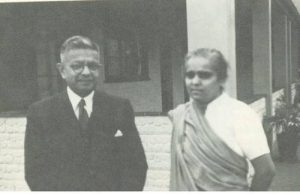
Later, when Manilal wanted to marry a Muslim girl, from a family who had hosted Gandhi and Kasturba in South Africa, Gandhi again discouraged him:
“Your marriage will be a great jolt to Hindu-Muslim relations.
That issue cannot be solved by intermarriage. You cannot forget that you are my son. Society will also not forget it. If you go through with this marriage you will not be able to serve your people. I also think that you will be unfit to continue working for Indian Opinion.
I cannot seek Ba’s consent, she will not give it, her whole life will be embittered I have no courage to tell her about this matter. May God show you the right path.”
Finally, it was Kasturba who put the question of Manilal’s marriage to rest. She found a bride for Manilal – Sushila from the Mashruwala family at Akola, with whom she got acquainted during her travels in India. Manilal was 34 years old then and Sushila was 20. It is quite remarkable that Manilal stayed steadfastly close to his parents through this long and tumultuous journey. He continued the work started by his father in South Africa. He visited India to take part in the struggles here, most notably the Salt Satyagraha, during which he was badly beaten up by the police and landed up in prison. He was a leading advocate of non-violence during the anti-apartheid struggle. He went to prison during the apartheid regime. He was the link between the eras of Gandhi and Mandela.
(6)
The relationship of Gandhi and Kasturba with their other two sons was relatively less eventful.
Ramdas, after his share of jail going and ashram life, decided to move to Bombay to be ‘economically self-sufficient’. Though, ‘Ba and Bapu did not like the plan’, they did not stop him. At Sevagram, on the night of consultations about his proposed move, Ramdas was struggling to go to sleep. ‘Ba put her hand on my forehead and tried to make me go to sleep as she used to do in our childhood days. With the touch of her cold hands, all my turmoil and perplexity evaporated and I could go to sleep in peace.’ Sushila Nayar wrote later that ‘Ramdas being the most delicate of Ba’s four sons, she had always had a soft corner for him.’

Devadas, though the youngest son, was seen, on various occasions, as Gandhi’s heir both by Gandhi and his brothers. In the absence of his brothers, with Harilal estranged, Manilal and Ramdas in South Africa, it was Devadas who accompanied his parents during their initial struggles in India. Devadas was with Gandhi and Kasturba at Champaran. He was with Gandhi during the non-cooperation movement. He went to prison during all the movements.He was also there to support his parents during their prison terms, fasts and illnesses. Young Devadas, in 1920, played a key role, along with Rajaji and Mahadev Desai, in ending the budding ‘indefinable’ relationship between Gandhi and Saraladevi Chaudhurani. Later, when the 27 year old Devadas wanted to marry the 15 year old daughter of Rajaji, both Gandhi and Rajaji deferred their permission – telling them that ‘parental permission was possible if after a few years spent without seeing or writing to each other they still wanted to marry.’ The girl’s age and not caste seems to have influenced their reluctance. Six years later, in 1933, Devadas and Lakshmi got married. Devadas also took up a career in journalism and went on become the editor of Hindustan Times. From her deathbed, Kasturba told Devadas, “The burden of looking after the family will have to be borne by you. Bapu is a saint. He has to think of the whole world. And you know all about Harilal. So the care of the family must fall to your lot?”
(7)
“Just as I became myself the victim of my spiritual experiments, so did Ba and you, the sons. But Ba has seen the wisdom of my experiments…”
Gandhi wasn’t exaggerating when he wrote the above line to Manilal in1918. More than all the sons, it was Kasturba who had to be under the continuous spell of Gandhi’s experiments. But, despite occasional flare-ups, it is unlikely that she saw herself as a victim.
Their relationship was laced with tenderness and, at times, a pragmatic detachment. Both of them had many close encounters with death, either through illness or injury. Whenever possible, they rushed to be with the other, nursing them with tenderness. When not possible, they had learnt to await the outcome with an anxious detachment.
In November, 1908, when Gandhi was in prison in South Africa, Kasturba had fallen seriously ill, due to her haemorrhage, at the Phoenix Farm. On hearing about it, Gandhi wrote to Albert West at the Farm:
“My Dear West,
Your telegram to hand. It cuts me but does not surprise me. It is impossible for me [to] leave here unless I pay the fine which I will not. When I embarked upon the struggle I counted the cost. If Mrs. Gandhi must leave me without even the consolation a devoted husband could afford, so be it.
Please do what you all can for her. I am wiring Harilal to go there. I expect from you or someone a daily bulletin—not that I can help thereby. Please let me know by wire what the disease is exactly. I am writing to her.1 I hope she will be alive and conscious to receive and understand the letter. The authorities will allow me to receive the letters daily. The enclosed is for Mrs. Gandhi. Let Manilal read it to her.”
The devoted husband was unwilling to pay the fine to be with his ailing wife. He had ‘counted the cost.’ In the enclosed letter – quite an unusual one, Gandhi wrote to Kasturba explaining his inability to be with her.
BELOVED KASTUR,
I have received Mr. West’s telegram today about your illness. It cuts my heart. I am very much grieved but I am not in a position to go there to nurse you. I have offered my all to the satyagraha struggle. My coming there is out of the question. I can come only if I pay the fine, which I must not. If you keep courage and take the necessary nutrition, you will recover. If, however, my ill luck so has it that you pass away, I should only say that there would be nothing wrong in your doing so in your separation from me while I am still alive. I love you so dearly that even if you are dead, you will be alive to me. Your soul is deathless. I repeat what I have frequently told you and assure you that if you do succumb to your illness, I will not marry again. Time and again I have told you that you may quietly breathe your last with faith in God. If you die, even that death of yours will be a sacrifice to the cause of satyagraha. My struggle is not merely political. It is religious and therefore quite pure. It does not matter much whether one dies in it or lives. I hope and expect that you will also think likewise and not be unhappy. I ask this of you.
Mohandas
Gandhi gives Kasturba hope of recovery, and at the same time, prepares her, and himself, for a possible death. It is apparent that this is not the first time he is having such an exchange with her. He reminds her of his assurance that he will not marry again.
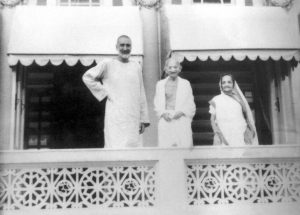
This acceptance of the inevitability of death did not stop Gandhi and Kasturba from pouring everything into taking care of each other, whenever they could. Millie Polak narrates one such incident, possibly the same incident that finds mention in Gandhi’s Autobiography:
The most remarkable cure that I knew of from the commencement of the Indian troubles to the end concerned Mrs. Gandhi herself. She was about forty at that time and had been ailing for a long while. She had consulted a doctor who treated her, but she grew worse, and eventually her condition, which had become serious, was diagnosed as pernicious anaemia. She was then living at Phoenix. Mr. Gandhi was in Johannesburg, and my husband and I were living in Durban. A night arrived when a hasty messenger came from Phoenix for us and the doctor. We got the last train to Phoenix and arrived, between eleven and midnight, at the bedside of Mrs. Gandhi, feeling very anxious.
We found her in a state of collapse, and whilst the doctor tried his restoratives, we, with the members of the family, waited. The night was got through, and as soon as possible Mr. Gandhi was telegraphed for. Mrs. Gandhi would not permit “Bapu” to be bothered so long as she had had the power to prevent it. But with her collapse things were taken out of her hands. Mr. Gandhi arrived next day, and in the meantime Mrs. Gandhi had rallied slightly. No possible hope, however, was given of her recovery, and at the most only a week or two of life could be looked for.
Mr. Gandhi put everything on one side and devoted himself entirely to her. During one of her conscious periods he asked her if she trusted him absolutely. She replied in the affirmative. Then he said: “Will you let me try and help you?” This she agreed to, placing herself entirely in his hands. After this he stopped all medicines and refused to allow the doctor to try and force his patient to take meat extracts. The doctor abused Mr. Gandhi, who, however, stood firm. Then, almost in despair and anger, the doctor practically threw up the case.
For the next two weeks Mr. Gandhi scarcely left his wife’s side. He fed her at intervals with pure lemon- juice, and no other food or drink of any kind was given to her. He poured his calm nerve-energy into her, and did for her all the little delicate duties that a very sick woman required. For these two weeks Mrs. Gandhi semi- consciously struggled for life, but by the end of that time a marked change was noticeable. The conscious periods were much longer, sleep became more natural, the dropsical swellings became less, and the eyes began to look clearer. Then, by slow degrees, a little fruit and milk were given, and lastly vegetables without condiments, and cereals. And without a single relapse, Mrs. Gandhi slowly but surely returned to health. Although that is over twenty years ago, she has not had a serious illness since, though she has endured a very difficult and strenuous life.
Mrs. Gandhi’s recovery from pernicious anaemia, at that time was almost in the nature of a miracle, for it was still looked upon as one of the fatal diseases, and very few cases indeed of recovery were on record. Certainly, so far as Mr. Gandhi knew, no previous case had been treated by lemon-juice, aided by what we today call mental healing. It was a great puzzle to the few medical men who knew or heard about it.
The doctor had suggested that Kasturba should be given beef tea. As per Gandhi’s account, Kasturba had also been stubborn in refusing to take beef tea, and said she would prefer to die in his arms. ‘He took her by rickshaw to Durban station and carried her in his arms to the train, which took them to Phoenix station.’
Kasturba did have another serious illness in 1914, when the final settlement of the Indian demands was underway. Gandhi wrote to his friend, Hermann Kallenbach:
Just now I am nothing but an efficient nurse devoting my whole energy to my task. Mrs. Gandhi is my sole consideration and she claims me. If I am away from her for any length of time she cries bitterly. I do not know what is to become. She may recover but there is not much chance. She will linger on for a while but cannot survive this illness. She has to be helped to do everything. I am only praying that there may be no imperative public call on me whilst I am doing this work.
Gandhi was writing this under immense stress of caring for Kasturba, and handling other political and personal issues. (He also wrote the other vicious letter cited earlier, during this phase.) Under Gandhi’s intense care, Kasturba did survive this bout of illness too.
Millie Polak was at hand, nearly a decade after the beef tea incident, in India, to record her version of another incident, where the roles were reversed for Gandhi and Kasturba.
“During my stay in India a day arrived when the sands of Mr. Gandhi’s own life seemed running out. For weeks he had been ill with some intestinal trouble. Two doctors were in constant attendance upon him, and were at their wits’ end to know how to feed him. They believed milk to be the only thing to keep him going, but as he had taken a vow about the taking of cow’s milk, neither the arguments of the doctors nor the absolute pleading on her knees of Mrs. Gandhi would make him break his vow. So those of us who loved him watched him sinking. I was at the time two days’ journey away from him, but was kept constantly advised of his condition. Then I received a little note of farewell, dictated by him to an amanuensis. He was dying and wished to send me a word of affection ere he passed out. Something within me told me it was not the end, and I wrote telling him so, adding that I knew his work for India was not yet finished, and that it was not “goodbye”.
He recovered under conditions of which he himself told me much later. He was content to leave the fleshly body that worried and hampered him so, and if milk was the only thing to save his body, he refused to break his vow by taking it. Then he said: “It was Ba (Mrs. Gandhi) who discovered a way. She said to me: ‘Your vow was taken against the milk of the cow, but it was not against the millk of the goat, so you can take goat’s milk and still keep your vow.’ You women are very persistent and clever,” he added, with a twinkle in his eye and an intonation in the voice, as though he almost admired Mrs. Gandhi for the subtle distinction she had been able to make use of to restore him to health. The goat’s milk had proved a great success, fortunately, and he gradually became himself again.”
Kasturba had been ‘persistent and clever’ in convincing Gandhi to break his vow, by showing him the escape route of goat’s milk. In general, Gandhi, even while valuing his and others lives immensely, was prepared to die, and was resigned to the fact that others would also die. This detachment was essential for using non-violence as a method of resistance. The willingness to sacrifice his and other lives was what differentiated non-violence from passive resistance, a term he moved away from.
(8)
During the first phase of Satyagraha in South Africa, only men had taken part in the struggle directly, and went to prison. But when a new marriage act was introduced, Gandhi had decided that the time had come for women to plunge into the movement. He had to first convince and enlist Kasturba. Narayan Desai reports Raojibhai Patel’s account of the discussion between Gandhi and Kasturba, when Gandhi succeeded in getting Kasturba to resolve that she would go to jail. (Both Gandhi and Kasturba had agreed that this was a more accurate account than Gandhi’s own in the Autobiography.)
One day, following the everyday routine, I took a bath after cleaning the toilets and went to the kitchen around nine-thirty. Around the same time, Gandhiji came there from the school. Kasturba was already in the kitchen. She had prepared the dough for bhakharis. She started rolling the bhakharis while I roasted them. Gandhiji was doing some miscellaneous work. Suddenly he asked Kasturba, ‘Have you heard?’
‘What?’ Kasturba asked curiously. Gandhiji replied with mild laughter, “Till today you were my legally married wife; but now on you are not my legal wife.’
Kasturba retorted with her eyebrows raised, ‘Who says so? Everyday you find a new fad!’
Gandhiji smiled and said, ‘I am not the one. That General Smuts says that our marriage was not registered like a Christian marriage, hence they are illegal. You are no longer my wife but a concubine.’
Kasturba was angry. ‘He may say what he likes. Does he not have any work that he has to start this new fad?’ Cutting her short Gandhiji asked, ‘What will you women do?’
‘What can we do?’ asked Kasturba. ‘You also fight like we do. If you want to be recognised as a wife and not a concubine and if dignity is dear to you, you too should fight the government.’
‘But you men go to the jails.’
‘You should go to jail for the sake of your self-respect.’
Kasturba was taken aback with these words. She asked, ‘I, going to jail? How can we women go to jails?’
‘Yes, you go to jail. Why can’t women go to jails? Why can’t women go through the same pleasures and sufferings that men go through? Sita followed Rama, Taramati followed Harishchandra and Damayanti took the path of Nala. All of them suffered great hardships in the forests.’
The conversation then gradually veered to food in jails. “If jail food is not conducive, eat fruits,’ said Gandhi. “Till they provide you with fruits you should fast.’
Kasturba laughed, ‘This is your way of sending me to death. I feel I will certainly die if I go to jail.’
Gandhiji burst out laughing, ‘Yes, yes. That’s what I want. If you die in the jail, I would worship you like the goddess Amba.’
‘All right, I shall go to jail.’ Kasturba expressed her firm resolve with this.
Gandhi planned that a batch of Satyagrahis from Phoenix would cross the border and move from Natal to Transvaal without permits and court arrest. Similarly another group from the Tolstoy Farm would cross the border in the opposite direction. The first batch of sixteen from Phoenix included four women – Kasturba, Chhaganlal’s wife Kashi, Maganlal’s wife Santok, and Pranjivan Mehta’s daughter Jayakunvar Doctor (Jeki), and the fifteen year old Ramdas Gandhi. The women refused to reveal their identities to the border police and insisted they would do so only in an open court. They were arrested and sentenced to three months prison. Their arrest opened the floodgates for many hundreds of women and men to enter the struggle.
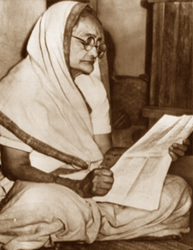
Amidst all this planning, Gandhi did not forget the special needs of Kasturba. He wrote to Kallenbach:
“I am dictating this to Ramdas as I am eating. I have your two letters. When you meet the train tomorrow you will not at once identify yourself but simply watch as a spectator. I am sending special foodstuff for Mrs. Gandhi. Until she is in jail she will use the food I have prepared. When she is sentenced you should take charge of her food and after you have received permission to give her special food you should take charge of the food. After the sentence and after you have made arrangements you should give it to the gaoler. So far as possible you would arrange for her to receive the food from the Government. She is only fruitarian, for health and religious reasons and she can take olive oil, bananas, plums, dried figs, almonds, tomatoes, grapes, oranges, lemons, banana flour, apples. You will stay there until everything is fixed up and either come here or return to Johannesburg according to the exigencies of the struggle and of your own personal affairs.”
However, in the Pietermaritzburg jail, where she was housed, Kasturba’s request for a fruit diet was denied. She went on a fast. On the fifth day of the fast, the government gave in. But the fruits given to her were meagre and she barely ate for three months. She came out emaciated. But she survived. There were others, like Valliammal and Nagappan, who didn’t.
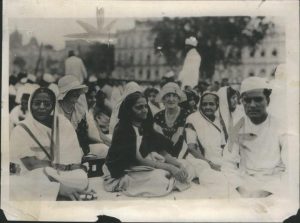
When Gandhi was asked to make a speech on Kasturba’s release, he sounded more solemn than delighted at meeting his wife again.
This is a very sad time for us. We can have no joy in gatherings and celebrations. All the same, I give thanks to you, on behalf of my wife and the other ladies, for the welcome you have accorded them. My brethren have lost their lives, killed by bullets, and I feel extremely sad, at a time like this, in taking part in this reception even to the extent that I have done. In gaol, I was free from all anxieties. This crying is perfectly suggestive of our mourning. My Indian brothers and sisters can at this time express their sincere sympathy with the helpless widows and orphans by themselves observing mourning in various ways. Men can leave off tobacco, betel-leaves and betel-nut; women may lay aside ornaments and fine dresses.
This was Kasturba’s only prison term in South Africa. There were many more to come in India. She did not again need any convincing to be done. She breathed her last in a prison on the laps of the man who got her to take that first step in South Africa.
(To be continued)
